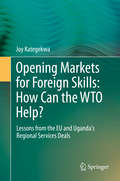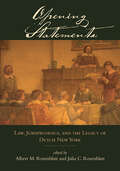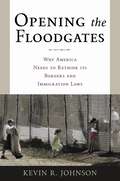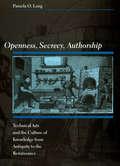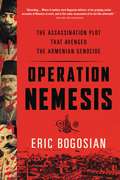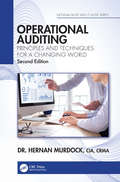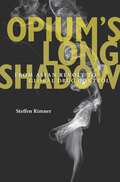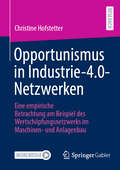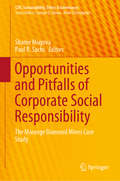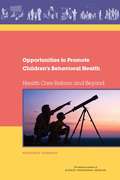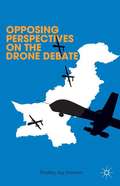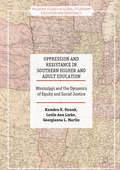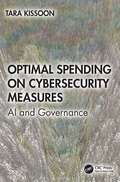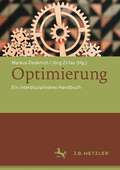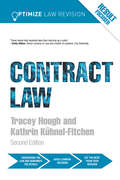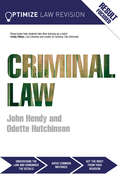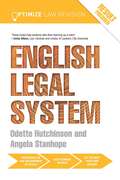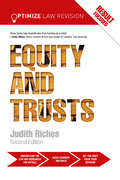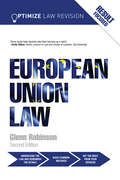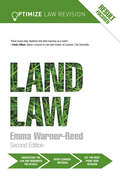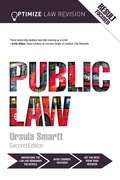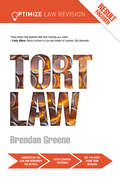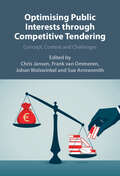- Table View
- List View
Opening Arguments
by Jeffrey ToobinIn January of 1987 Jeffrey Toobin is fresh out of Harvard Law School, and appointed the youngest lawyer on Special Prosecutor Lawrence Walsh's team to investigate and try the leading figure in the Iran-Contra affair--Oliver North. For twenty-eight thrilling months, Toobin served on Walsh's staff and came of age into his profession. Toobin's first book and immersive account of that period is the story of a young man's awakening to the realities of law and a policial, legal and moral drama on a grand stage. Through this defining case of the 1980s--which featured obstruction of justice, diversion of funds, and personal corruption--Opening Arguments shows the judicial process at work. The Congressional Iran-Contra committees granted the key figures of the trial immunity, so Toobin and his colleagues had to work in the dark, without accesss to newspapers or television for weeks at a time. The Reagan Justice Department provided difficulties too. On page after page, Toobin illuminates these battles against long odds, portraying the climactic North trial itself with the eye of a novelist. Like a morality tale with few losers and no real winners, Bill Moyers calls Opening Arguments "a valuable account of how politics and law entwined in the Iran-Contra trials... Reading it can be a citizen's education, too."
Opening Markets for Foreign Skills: How Can the WTO Help?
by Joy KategekwaThe Mode 4 commitments of WTO Members are narrow and shallow. Even though trade negotiations for enhanced Mode 4 access started well before the launch of the DDA- prospects for success are thin. These negotiations followed a traditional mercantilist approach- with limited attention to the underlying difficulties countries face in letting people into their borders, either generally, or on the basis of a WTO GATS commitment. This Book argues that this approach alone will not succeed. It proposes a focus not on trading market access concessions only, but on discussions aimed at understanding each other's regulatory approaches. To date, in terms of the literature available, we know very little about how WTO Members are managing their Mode 4 commitments. We know even less about how the WTO could learn from clearly more advanced steps in regional liberalization processes. This Book addresses these issues- through case studies of market access and national treatment commitments, and regulatory approaches in Economic Integration Agreements of a select group of WTO Members.
Opening Statements: Law, Jurisprudence, and the Legacy of Dutch New York (Excelsior Editions)
by Albert M. Rosenblatt Julia C. RosenblattNo society can function without laws, that set of established practices and expectations that guide the way people get along with one another and relate to ruling authorities. Although much has been written about the English roots of American law and jurisprudence, little attention has been paid until recently to the legacy left by the Dutch. In Opening Statements, a broad spectrum of eminent scholars examine the legal heritage that New Netherland bequeathed to New York in the seventeenth century. Even after the transfer of the colony to England placed New York under English Common Law rather than Dutch Roman Law, the Dutch system of jurisprudence continued to influence evolving American concepts of governance, liberty, women's rights, and religious freedom in ways that still resonate in today's legal culture."Opening Statements addresses only a short chapter in the long history of America. Its judgments will not be without dispute, but then, as the eminent Dutch historian Pieter Geyl once wrote: 'History is an argument without end.' There can be no doubt, however, as to the value of those seeds of freedom that were deeply planted in New Netherland. They produced a revolutionary harvest that causes us to appreciate what the Dutch inspired. A small country, the Netherlands—yes—but always a powerful ally for America in the unending struggle for a well-ordered society where freedom and justice prevail." — from the Foreword by William J. vanden Heuvel
Opening the Floodgates: Why America Needs to Rethink its Borders and Immigration Laws (Critical America #80)
by Kevin R. JohnsonSeeking to re-imagine the meaning and significance of the international border, Opening the Floodgates makes a case for eliminating the border as a legal construct that impedes the movement of people into this country.Open migration policies deserve fuller analysis, as evidenced by President Barack Obama’s pledge to make immigration reform a priority. Kevin R. Johnson offers an alternative vision of how U.S. borders might be reconfigured, grounded in moral, economic, and policy arguments for open borders. Importantly, liberalizing migration through an open borders policy would recognize that the enforcement of closed borders cannot stifle the strong, perhaps irresistible, economic, social, and political pressures that fuel international migration.Controversially, Johnson suggests that open borders are entirely consistent with efforts to prevent terrorism that have dominated immigration enforcement since the events of September 11, 2001. More liberal migration, he suggests, would allow for full attention to be paid to the true dangers to public safety and national security.
Openness, Secrecy, Authorship: Technical Arts and the Culture of Knowledge from Antiquity to the Renaissance
by Pamela O. LongA history of the book and intellectual property that includes military technology and military secrets.Winner of The Morris D. Forkosch Prize from the Journal of the History of IdeasIn today's world of intellectual property disputes, industrial espionage, and book signings by famous authors, one easily loses sight of the historical nature of the attribution and ownership of texts. In Openness, Secrecy, Authorship: Technical Arts and the Culture of Knowledge from Antiquity to the Renaissance, Pamela Long combines intellectual history with the history of science and technology to explore the culture of authorship. Using classical Greek as well as medieval and Renaissance European examples, Long traces the definitions, limitations, and traditions of intellectual and scientific creation and attribution. She examines these attitudes as they pertain to the technical and the practical. Although Long's study follows a chronological development, this is not merely a general work. Long is able to examine events and sources within their historical context and locale. By looking at Aristotelian ideas of Praxis, Techne, and Episteme. She explains the tension between craft and ideas, authors and producers. She discusses, with solid research and clear prose, the rise, wane, and resurgence of priority in the crediting and lionizing of authors. Long illuminates the creation and re-creation of ideas like "trade secrets," "plagiarism," "mechanical arts," and "scribal culture." Her historical study complicates prevailing assumptions while inviting a closer look at issues that define so much of our society and thought to this day. She argues that "a useful working definition of authorship permits a gradation of meaning between the poles of authority and originality," and guides us through the term's nuances with clarity rarely matched in a historical study.
Operation Nemesis: The Assassination Plot that Avenged the Armenian Genocide
by Eric BogosianA masterful account of the assassins who hunted down the perpetrators of the Armenian GenocideIn 1921, a tightly knit band of killers set out to avenge the deaths of almost one million victims of the Armenian Genocide. They were a humble bunch: an accountant, a life insurance salesman, a newspaper editor, an engineering student, and a diplomat. Together they formed one of the most effective assassination squads in history. They named their operation Nemesis, after the Greek goddess of retribution. The assassins were survivors, men defined by the massive tragedy that had devastated their people. With operatives on three continents, the Nemesis team killed six major Turkish leaders in Berlin, Constantinople, Tiflis, and Rome, only to disband and suddenly disappear. The story of this secret operation has never been fully told, until now. Eric Bogosian goes beyond simply telling the story of this cadre of Armenian assassins by setting the killings in the context of Ottoman and Armenian history, as well as showing in vivid color the era's history, rife with political fighting and massacres. Casting fresh light on one of the great crimes of the twentieth century and one of history's most remarkable acts of vengeance, Bogosian draws upon years of research and newly uncovered evidence. Operation Nemesis is the result--both a riveting read and a profound examination of evil, revenge, and the costs of violence.
Operational Auditing: Principles and Techniques for a Changing World (Internal Audit and IT Audit #11)
by Hernan MurdockOperational Auditing: Principles and Techniques for a Changing World, 2nd edition, explains the proven approaches and essential procedures to perform risk-based operational audits. It shows how to effectively evaluate the relevant dynamics associated with programs and processes, including operational, strategic, technological, financial and compliance objectives and risks. This book merges traditional internal audit concepts and practices with contemporary quality control methodologies, tips, tools and techniques. It explains how internal auditors can perform operational audits that result in meaningful findings and useful recommendations to help organizations meet objectives and improve the perception of internal auditors as high-value contributors, appropriate change agents and trusted advisors. The 2nd edition introduces or expands the previous coverage of: • Control self-assessments. • The 7 Es framework for operational quality. • Linkages to ISO 9000. • Flowcharting techniques and value-stream analysis • Continuous monitoring. • The use of Key Performance Indicators (KPIs) and Key Risk Indicators (KRIs). • Robotic process automation (RPA), artificial intelligence (AI) and machine learning (ML); and • Adds a new chapter that will examine the role of organizational structure and its impact on effective communications, task allocation, coordination, and operational resiliency to more effectively respond to market demands.
Opferorientierung im Strafvollzug: Eine rechtsdogmatische Untersuchung zur Auslegung opferbezogener Vorschriften im deutschen Strafvollzugsrecht
by Katharina Marianne RadkeBereits seit den 1980er Jahren wurde eine Einbeziehung des Straftatopfers und seiner Belange in das deutsche Strafvollzugsrecht diskutiert. Im Strafvollzugsgesetz des Bundes spielte die Opferorientierung gleichwohl eine untergeordnete Rolle. Erst mit den nach der Föderalismusreform von 2006 erlassenen Landesstrafvollzugsgesetzen wurde die Opferorientierung umfangreich in das Strafvollzugsrecht einbezogen. Durch die Berücksichtigung von Opferinteressen bei der Ausgestaltung des Vollzugs der Freiheitsstrafe ergeben sich eine Vielzahl neuer strafvollzugsrechtlicher Fragestellungen. Diese betreffen beispielsweise die Vereinbarkeit von Opferorientierung und Resozialisierung, den Schutz von Opfern vor inhaftierten Täter*innen und die Möglichkeiten von Wiedergutmachung und Tatausgleich während der Inhaftierung. In diesem Buch werden die Hintergründe der Opferorientierung des Strafvollzugsrechts untersucht und so Maßstäbe zur Auslegung der opferorientierten Vorschriften der Landesstrafvollzugsgesetze entwickelt. Bei der Auslegung der opferorientierten Strafvollzugsvorschriften werden alle 16 Landesstrafvollzugsgesetze einbezogen. Dadurch wird versucht, zahlreiche Fragen zu beantworten, die sich durch die Berücksichtigung des Opfers und seiner Interessen innerhalb der Landesstrafvollzugsgesetze stellen.
Opium’s Long Shadow: From Asian Revolt to Global Drug Control
by Steffen RimnerIn 1920 the League of Nations Advisory Committee on the Traffic in Opium and Other Dangerous Drugs captured eight decades of political turmoil over opium trafficking. Steffen Rimner shows how local protests crossed imperial, national, and colonial boundaries to harness naming and shaming in international politics—a deterrent that continues today.
Opportunismus in Industrie-4.0-Netzwerken: Eine empirische Betrachtung am Beispiel des Wertschöpfungsnetzwerks im Maschinen- und Anlagenbau
by Christine HofstetterInnerhalb zwischenbetrieblicher Beziehungen gilt Opportunismus seit jeher als zentrales Problem, das trotz großer Forschungsbemühungen noch viele Fragen aufwirft. Erschwerend kommt hinzu, dass Industrie 4.0 weitreichende Veränderungen in den Wertschöpfungsarchitekturen mit sich bringt. Die Wissenschaft hat die Erforschung von Opportunismus in der sich neu herausbildenden Netzwerkumgebung jedoch vernachlässigt. Das vorliegende Buch untersucht unter Zuhilfenahme relevanter Theorien die den Opportunismus betreffenden Wirkungen ausgewählter Determinanten (strukturelle Einbettung, externe Unsicherheit, Abhängigkeit, distributive Ungerechtigkeit, Einsatz von Verträgen, intrinsische Motivation, gemeinsame Beziehungserfahrung) und ihr Zusammenspiel mit dem Moderator Sozialkapital in einer Industrie-4.0-Netzwerkumgebung. Unter Rückbesinnung auf Theorien aus der Psychologie und Soziologie werden zudem die jeweiligen Opportunismusadressaten identifiziert, welche in der dyadischen Forschung naturgemäß offensichtlich waren. Eine qualitativ-empirische Untersuchung von sechs Wertschöpfungsnetzwerken im Industriegütermarkt stützt nicht nur die getätigten Vorannahmen, sondern bringt auch eine völlig neue Größe ins Spiel: das Ökonomische Kapital.
Opportunities and Pitfalls of Corporate Social Responsibility: The Marange Diamond Mines Case Study (CSR, Sustainability, Ethics & Governance)
by Shame Mugova Paul R. SachsThis book addresses key aspects of corporate social responsibility (CSR) and explores them from a variety of perspectives in a case study on the Marange diamond mines in Zimbabwe. The business case of the Marange mines is presented to demonstrate the challenge of practicing social responsibility while considering and balancing the needs of a developing nation, environmental protection, community involvement and international business. Lessons learned from the case study will help business leaders and strategists in developing countries and multinational corporations to better understand and employ CSR principles so as to enhance sustainability and social impact. Further, the book provides a unique combination of academic, industrial and local approaches.
Opportunities to Promote Children's Behavioral Health: Workshop Summary
by Steve OlsonThe Patient Protection and Affordable Care Act (ACA), which was signed into law in 2010, has several provisions that could greatly improve the behavioral health of children and adolescents in the United States. It requires that many insurance plans cover mental health and substance use disorder services, rehabilitative services to help support people with behavioral health challenges, and preventive services like behavioral assessments for children and depression screening for adults. These and other provisions provide an opportunity to confront the many behavioral health challenges facing youth in America. To explore how the ACA and other aspects of health care reform can support innovations to improve children's behavioral health and sustain those innovations over time, the Forum on Promoting Children's Cognitive, Affective, and Behavioral Health held a workshop on April 1-2, 2015. The workshop explicitly addressed the behavioral health needs of all children, including those with special health needs. It also took a two-generation approach, looking at the programs and services that support not only children but also parents and families. This report summarizes the presentations and discussions of this workshop.
Opposing Perspectives on the Drone Debate
by Bradley Jay StrawserDoes the lethal use of drones pose any new or difficult moral problems? Or is the controversy over these weapons merely a distraction from deeper questions regarding the justice of war and the United States' bellicose foreign policy? Opposing Perspectives on the Drone Debate pulls no punches in answering these questions as five scholars square off in a lively debate over the ethics of drones and their contentious use in a point-counterpoint debate. The contributing authors are some of the foremost thinkers in international affairs today, spanning the disciplines of philosophy, sociology, political science, and law. Topics debated range from the US's contested policy of so-called "targeted killing" in Pakistan's tribal regions to fears over the damaging effects such weaponry has on our democratic institutions to the more abstract moral questions raised by killing via remote control such as the duty to capture over kill.
Oppression and Resistance in Southern Higher and Adult Education
by Kamden K. Strunk Leslie Ann Locke Georgianna L. MartinThis book explores the long history of oppression and resistance in adult and higher education, situated in Mississippi. The state serves as a unique site in which intersecting narratives around race, ethnicity, social class, opportunity, democracy, and equity have played out over the past several decades. In this book, the authors highlight the experiences of students and adults in Mississippi who provide both covert, subtle resistance to the dominant, oppressive educational narrative in the state, as well as those who provide active, visible resistance. Using critical pedagogy and critical theory to drive their analysis, the authors highlight the systematic and continuous nature of oppression, and theorize ways forward toward liberation in Mississippi, the South, and the nation.
Optimal Spending on Cybersecurity Measures: AI and Governance
by Tara KissoonThe aim of this book is to demonstrate the use of business‑driven risk assessments to address government regulations and guidelines specific to AI risks, as AI systems often require access to personal data. All aspects of AI, machine learning models, continuous learning, generalization, and predictive and descriptive analytics are dependent on massive datasets. The more diverse and comprehensive the data, the better an AI can perform. Therefore, AI systems require vast amounts of personal data, and should this data be accessed by unauthorized individuals or organizations, it will lead to a privacy breach, which may result in personal harm to citizens, i.e., identity theft.This book introduces the cyber risk investment model and the cybersecurity risk management framework used within business‑driven risk assessments to address government regulations, industry standards, and applicable laws. It can be used by various stakeholders who are involved in the implementation of cybersecurity measures to safeguard sensitive data. This framework facilitates an organization’s risk management decision‑making process to demonstrate the mechanisms in place to fund cybersecurity measures and demonstrates the application of the process by showcasing two case studies.Features: Aims to strengthen the reader’s understanding of industry governance, AI risk, and compliance practices. Incorporates an innovative approach to assess business risk management specific to AI systems. Explores the strategic decisions made by organizations when implementing cybersecurity measures and leverages an integrated approach to include risk management elements.
Optimierung: Ein interdisziplinäres Handbuch
by Jörg Zirfas Markus DederichDieses interdisziplinäre Handbuch rekonstruiert Optimierung als ein Phänomen, das konstitutiv in aktuelle Entwicklungen der Gegenwart eingeschrieben ist. Denn es erscheint kaum mehr möglich, nicht optimieren zu wollen oder zu können. Das gilt für die Arbeit an sich selbst, die Verbesserung des Anderen und die Perfektionierung der Welt. Optimierung verspricht messbare Steigerungen von Effektivität und Effizienz sowie eine Erweiterung der Reichweite von Einfluss und Macht. Sie wirft aber auch Fragen der Instrumentalisierung, der Verdinglichung und Entfremdung sowie Fragen nach Grenzen und Unverbesserlichkeiten auf. Ohne eine Auseinandersetzung mit der Idee der Optimierung lässt sich eine moderne Humanwissenschaft heute nicht mehr konzipieren.
Optimize Contract Law (Optimize)
by Tracey Hough Kathrin Kuhnel-FitchenThe Optimize series is designed to show you how to apply your knowledge in assessment. These concise revision guides cover the most commonly taught topics, and provide you with the tools to: Understand the law and remember the details using diagrams and tables throughout to demonstrate how the law fits together Contextualise your knowledge identifying and explaining how to apply legal principles for important cases providing cross-references and further reading to help you aim higher in essays and exams Avoid common misunderstandings and errors identifying common pitfalls students encounter in class and in assessment Reflect critically on the law identifying contentious areas that are up for debate and on which you will need to form an opinion Apply what you have learned in assessment presenting learning objectives that reflect typical assessment criteria providing sample essay and exam questions, supported by end-of chapter feedback The series is also supported by comprehensive online resources that allow you to track your progress during the run-up to exams. This second edition has been fully amended to reflect the latest cases and developments in the Law, as well as new and improved diagrams throughout
Optimize Criminal Law (Optimize)
by John Hendy Odette HutchinsonThe Optimize series is designed to show you how to apply your knowledge in assessment. These concise revision guides cover the most commonly taught topics, and provide you with the tools to: Understand the law and remember the details · using diagrams and tables throughout to demonstrate how the law fits together Contextualise your knowledge · identifying and explaining how to apply legal principles for important cases · providing revision advise to help you aim higher in essays and exams Avoid common misunderstandings and errors · identifying common pitfalls students encounter in class and in assessment Reflect critically on the law · identifying contentious areas that are up for debate and on which you will need to form an opinion Apply what you have learned in assessment · presenting learning objectives that reflect typical assessment criteria · providing sample essay and exam questions, supported by end-of-chapter feedback The series is also supported by comprehensive online resources that allow you to track your progress during the run-up to exams. www.routledge.com/cw/optimizelawrevision
Optimize English Legal System: Optimize English Legal System (Optimize)
by Odette Hutchinson Angela Stanhope‘[Optimize is] ideal for undergraduate students at all levels. The content is of a high standard, easy to read and understand. The materials are very catching and easy on the eye making it easy to read and digest the materials…an essential study tool for all law students' - George Ellison, Derby ‘I am really impressed…the strengths are the user friendly format, clear explanations, helpful diagrams/flowcharts and appropriate suggestions for analysing the issues concerned’ - Katherine Davies, Northumbria The Optimize series is designed to show you how to apply your knowledge in assessment. These concise revision guides cover the most commonly taught topics, and provide you with the tools to: Understand the law and remember the details o using diagrams and tables throughout to demonstrate how the law fits together Contextualise your knowledge o identifying and explaining how to apply legal principles for important cases o providing revision advice to help you aim higher in essays and exams Avoid common misunderstandings and errors o identifying common pitfalls students encounter in class and in assessment Reflect critically on the law o identifying contentious areas that are up for debate and on which you will need to form an opinion Apply what you have learned in assessment o presenting learning objectives that reflect typical assessment criteria o providing sample essay and exam questions, supported by end-of chapter feedback The series is also supported by comprehensive online resources that allow you to test your progress during the run-up to exams. URL: www.routledge.com/cw/optimizelawrevision/
Optimize Equity and Trusts (Optimize)
by Judith RichesThe Optimize series is designed to show you how to apply your knowledge in assessment. These concise revision guides cover the most commonly taught topics, and provide you with the tools to: Understand the law and remember the details using diagrams and tables throughout to demonstrate how the law fits together Contextualise your knowledge identifying and explaining how to apply legal principles for important cases providing cross-references and further reading to help you aim higher in essays and exams Avoid common misunderstandings and errors identifying common pitfalls students encounter in class and in assessment Reflect critically on the law identifying contentious areas that are up for debate and on which you will need to form an opinion Apply what you have learned in assessment presenting learning objectives that reflect typical assessment criteria providing sample essay and exam questions, supported by end-of chapter feedback The series is also supported by comprehensive online resources that allow you to track your progress during the run-up to exams.
Optimize European Union Law (Optimize)
by Glenn RobinsonThe Optimize series is designed to show you how to apply your knowledge in assessment. These concise revision guides cover the most commonly taught topics, and provide you with the tools to: Understand the law and remember the details using diagrams and tables throughout to demonstrate how the law fits together Contextualise your knowledge identifying and explaining how to apply legal principles for important cases providing cross-references and further reading to help you aim higher in essays and exams Avoid common misunderstandings and errors identifying common pitfalls students encounter in class and in assessment Reflect critically on the law identifying contentious areas that are up for debate and on which you will need to form an opinion Apply what you have learned in assessment presenting learning objectives that reflect typical assessment criteria providing sample essay and exam questions, supported by end-of chapter feedback The series is also supported by comprehensive online resources that allow you to track your progress during the run-up to exams.
Optimize Land Law (Optimize)
by Emma Warner-ReedThe Optimize series is designed to show you how to apply your knowledge in assessment. These concise revision guides cover the most commonly taught topics, and provide you with the tools to: Understand the law and remember the details using diagrams and tables throughout to demonstrate how the law fits together Contextualise your knowledge identifying and explaining how to apply legal principles for important cases providing cross-references and further reading to help you aim higher in essays and exams Avoid common misunderstandings and errors identifying common pitfalls students encounter in class and in assessment Reflect critically on the law identifying contentious areas that are up for debate and on which you will need to form an opinion Apply what you have learned in assessment presenting learning objectives that reflect typical assessment criteria providing sample essay and exam questions, supported by end-of-chapter feedback The series is also supported by comprehensive online resources that allow you to track your progress during the run-up to exams.
Optimize Public Law (Optimize)
by Ursula SmarttThe Optimize series is designed to show you how to apply your knowledge in assessment. These concise revision guides cover the most commonly taught topics, and provide you with the tools to: Understand the law and remember the details using diagrams and tables throughout to demonstrate how the law fits together Contextualise your knowledge identifying and explaining how to apply legal principles for important cases providing cross-references and further reading to help you aim higher in essays and exams Avoid common misunderstandings and errors identifying common pitfalls students encounter in class and in assessment Reflect critically on the law identifying contentious areas that are up for debate and on which you will need to form an opinion Apply what you have learned in assessment presenting learning objectives that reflect typical assessment criteria providing sample essay and exam questions, supported by end-of chapter feedback The series is also supported by comprehensive online resources that allow you to track your progress during the run-up to exams.
Optimize Tort Law (Optimize)
by Brendan GreeneThe Optimize series is designed to show you how to apply your knowledge in assessment. These concise revision guides cover the most commonly taught topics, and provide you with the tools to: Understand the law and remember the details using diagrams and tables throughout to demonstrate how the law fits together Contextualise your knowledge identifying and explaining how to apply legal principles for important cases providing cross-references and further reading to help you aim higher in essays and exams Avoid common misunderstandings and errors identifying common pitfalls students encounter in class and in assessment Reflect critically on the law identifying contentious areas that are up for debate and on which you will need to form an opinion Apply what you have learned in assessment presenting learning objectives that reflect typical assessment criteria providing sample essay and exam questions, supported by end-of chapter feedback The series is also supported by comprehensive online resources that allow you to track your progress during the run-up to exams.
Optimizing Public Interests through Competitive Tendering: Concept, Context and Challenges
by Sue Arrowsmith Chris Jansen Frank Van Ommeren Johan WolswinkelGovernments are increasingly trying to achieve a variety of public interests through competitive tendering of public contracts, authorisations, subsidies as well as public assets. Over the past decades, domestic and EU law has developed for these 'limited rights' at different speed and is extremely fragmented: there is no coherent legal framework. This book provides information on the legal aspects of competitive allocation of all types of limited rights on the basis of an overarching perspective. It explains the impact of the legal framework on the ability of governments to achieve the public interests they pursue through competitive tendering. The book is relevant for domestic and EU public authorities, legislators, courts of law, as well as academics. It discusses and connects in a consistent manner, legal questions arising in the framework of competitive allocation of public contracts, authorisations, subsidies and public assets.

